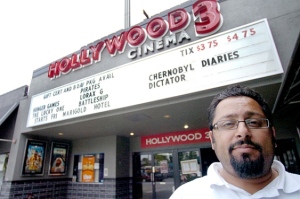By Mary Erickson
We are in an era of hefty media conglomeration at all levels of contemporary media’s journey to its audience. Comcast wants to take over Time Warner Cable, further monopolizing the cable delivery system in the U.S. This week, Time Warner (different yet formerly related to Time Warner Cable) rejected a takeover bid by Rupert Murdoch’s 21st Century Fox but is contemplating a merger with CBS. Disney has grown massive thanks to acquisitions of Marvel, Lucasfilm, Pixar and other entertainment companies. In Canada, the media landscape has become increasingly concentrated, with five companies accounting for 71% of revenue generated from media.
The movie theater business is no stranger to industry concentration. Five companies own over half of the movie screens in the U.S. and Canada, with further consolidation in the industry continually happening.
It is, then, doubly discouraging when we see one of these independent ventures closing its doors. Today, Clova Cinema in Cloverdale, BC, is ending its 67-year run, having suffered declining ticket sales especially in the last year. Pair this with the required substantial investment of transitioning to digital projection, a trend experienced by nearly all independent theaters, and the Clova couldn’t continue to sustain itself. Owner Craig Burghardt finally opted to close the business and sell the building to a church.
Several other theaters in the Lower Mainland have closed just in the last 18 months, including Dolphin Cinema in Burnaby, the Rialto Theatre in South Surrey, and Collingwood Cinema and the Ridge Theatre, both in Vancouver. As it stands, there are not that many movie theater options, and even fewer independent theaters. The same obstacles that forced Clova’s closure are also at play with these theaters: equipping theaters with digital projection capabilities, declining ticket sales, rising rent costs, and competition with other ways of watching movies, whether it’s video-on-demand, DVDs, or cable television.
What is the result of this? Fewer venues for locally-produced media, for one, and fewer locally-owned businesses. The remaining independent theaters are heavily reliant on playing mainstream fare – the Guardians of the Galaxy type movies, rather than independently produced or, often, even Indiewood-produced films.
There are other ramifications here as well. These community gathering places are special and meaningful for their patrons. They have contributed to the community’s history and memory. They are markers for the vitality and connectivity of a community. When these theaters are sold, absorbed and reconstituted into condos or offices or churches, we are witnessing the disappearance of another contributor to local arts and culture.

Owner Rahim Manji and the Hollywood 3 Cinema in Pitt Meadows (image: Maple Ridge-Pitt Meadows Times)
So then it is heartwarming to see independent ventures operating successfully, expanding and improving their programs or facilities to accommodate their role as contributors to a cultural community. Rahim Manji owns Hollywood 3 Cinemas, a small independent theater chain comprised of three theater houses in southwest BC (the Caprice Duncan, the Hollywood 3 Surrey, and the Hollywood 3 Pitt Meadows). Although Manji sold the aforementioned Dolphin Cinema in Burnaby – a decided loss to the community — he concentrated efforts to improve the other theaters, switching each of them to digital projection. In addition, new seats and improved sound equipment were also installed in two of the three theaters in order to give audiences theater experiences that can compete with nearby multiplexes like Silver City.
And it’s heartwarming to see audiences lining up to see movies at these theaters, supporting these local businesses. Without this support, obviously, these theaters will not survive. As it stands, they are usually hanging on by a thread. Their contribution to the community requires a reciprocal contribution from the community. And that starts with the acknowledgement that these theaters are important, that they make a difference, and that they are part of the community’s identity.
Dr. Mary Erickson is the Founder and Director of the Pacific Northwest Media Research Consortium. She is also a film/media consultant and researcher whose work focuses on independent film, regional film, and global film industry,. Her book, “Independent Filmmaking Around the Globe” (co-edited with Doris Baltruschat), will be released by the University of Toronto Press in January 2015.



